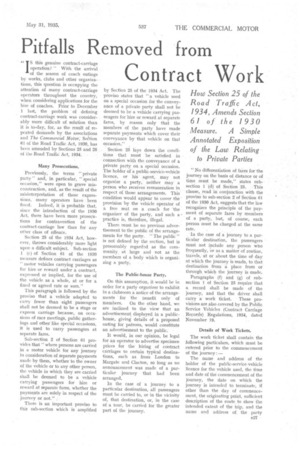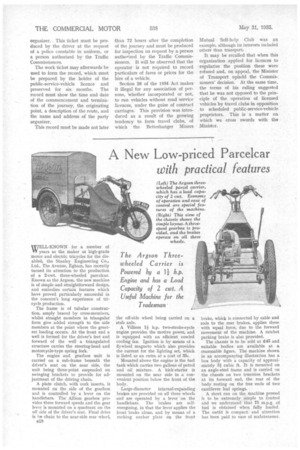Pitfalls Removed from
Page 45

Page 46

If you've noticed an error in this article please click here to report it so we can fix it.
Contract Work
How Section 25 of the Road Traffic Act, 1934, Amends Section 61 of the 1930 Measure. A Simple Annotated Exposition of the Law Relating to Private Parties
i " S this genuine contract-carriage operation?' With the arrival
of the season of coach outings by works, clubs and other organizations, this question is occupying the attention of many contract-carriage operators throughout the country, when considering applications for the hire of coaches. Prior to December 1 last, the problem of defining contract-carriage work was considerably more difficult of solution than it is to-day, for, as the result of repeated demands by the associations and The Commercial Motor, Se/tion 61 of the Road Traffic Act, 1930, has been amended by Sections 25 and 26 of the Road Traffic Act, 1934,
Many Prosecutions.
Previously, the terms "private party" and, in particular, "special. occasion," were open to grave misconstruction, and, as the result of the misinterpretation of these expressions, many operators have been
fined. Indeed, it is probable that, since the introduction of the 1930 Act, there have been more prosecutions for contravention of the contract-carriage law than for any other class of offence.
Section 25 of the 1934 Act, however, throws considerably more light upon a difficult subject. Sub-section 1 (c) of Section 61 of the 1930 measure defines contract carriages as motor vehicles carrying passengers for hire or reward under a contract, expressed or implied, for the use of the vehicle as a whole, at or for a fixed or agreed rate or sum."
This paragraph is followed by the proviso that a vehicle adapted to carry fewer than eight passengers shall not be deemed to be a stage or express carriage because, on occasions of race meetings, public gatherings and other like special occasions, it is used to carry passengers at separate fares.
Sub-section 2 of Section 61 pro vides that "where persons are carried in a motor vehicle for any journey in consideration of Separate payments made by them, whether to the owner of the vehicle or to any other person, the vehicle in which they are carried shall be deemed to be a vehicle carrying passengers for hire or reward at separate fares, whether the payments are solely in respect of the . journey or not."
There is an important proviso to this sub-section which is amplified by Section 25 of the 1934 Act. The proviso states that "a vehicle used on a special occasion for the conveyance of a private party shall not be deemed to be a vehicle carrying passengers for hire or reward at separate fares, by reason only that the members of the party have made separate payments which cover their conveyance by that vehicle on that occasion."
Section 25 lays down the conditions that must be satisfied in connection with the conveyance of a private party on a special occasion. The holder or a public-service-vehicle licence, or his agent, may not otganize a party, neither may a person who receives remuneration in respect of those arrangements. This condition would appear to cover the provision by the vehicle operator of a free seat on a coach for the organizer of the party, and such a• practice is, therefore, illegal.
There must be no previous advertisement to the public of the arrangements for the party, " The public" is not defined by the section, but is presumably regarded as the community_ at large and not as the members of a body which is organizing a party.
The Public-house Party.
On this assumption, it would be in order for a party organizer to exhibit in a clubroom a notice of the arrangements for the benefit only of members. On the other hand, we are inclined to the view that an advertisement displayed in a publichouse, giving details of a proposed outing for patrons, would constitute an advertisement to the public.
It would, in our opinion, be legal for an operator to advertise specimen prices for the hiring of contract carriages to certain typical destinations, such as from London to Margate and Clacton, so long as no announcement was made of a particular journey that had been arranged.
In the case of a journey to a particular destination, all passengers must be carried to, or in the vicinity of, that destination, or, in the case of a tour, be carried for the greater part of the journey. "No differentiation of fares for the journey on the basis of distance or of time must be made," states sub section 1 (d) of Section 25. This clause, read in conjunction with the proviso to sub-section 2 of Section 61 of the 1930 Act, suggests that the law recognizes the principle of the payment of separate fares by members of a party, but, of course, each person must be charged at the same rate.
In the case of a journey to a particular destination, the passengers must not include any person who frequently, or as a matter of routine, travels, at or about the time of day at which the journey is made, to that destination from a place from or through. which the journey is made.
Paragraphs (f) and (g) of subsection 1 of Section 25 require that a record shall be made of the journey, and that the driver shall carry a work ticket. These provisions are also covered by the Public Service Vehicles (Contract Carriage Records) Regulations, 1934, dated November 19.
Details of Work Tickets.
The work ticket shall contain the following particulars, which must be entered prior to the commencement of the journey :—
The name and address of the holder of the public-service-vehicle licence for the vehicle used, the time and date of the commencement of the journey, the date on which the journey is intended to terminate, if other than the day of commencement, the originating point, sufficient description of the route. to show the intended extent of the trip, and the name and address of the party 1127
organizer. This ticket must be produced by the driver at the request of a police constable in uniform, or a person authorized by the Traffic Commissioners.
The work ticket may afterwards be used to form the record, which must be prepared by the holder of the public-service-vehicle licence and preserved for six months. The record must show the time and date of the commencement and termination of the journey, the originating point, a description of the route, and the name and address of the party organizer.
This record must be made not later than 72 hours after the completion of the journey and must be produced for inspection on request by a person authorized by the Traffic Commissioners. It will be observed that the operator is not required to record particulars of fares or prices for the hire of a vehicle.
Section 26 of the 1984 Act makes it illegal for any association of persons, whether incorporated or not, to run vehicles without road service licences, under the guise of contract carriages. This provision was introduced as a result of the growing tendency to form travel clubs, of which the Betteshanger Miners Mutual Self-help Club was an example, although its interests included others than transport.
It may be recalled that when this organization applied for licences to .reg-ularize the position these were refused and, on appeal, the Minister of Transport upheld the Commissioners' decision. At the same time, the terms of his ruling suggested that he was not opposed to the principle of the operation of licensed vehicles by travel clubs in opposition to scheduled public-service-vehicle proprietors. This is a matter on which we cross swords with the Minister.




































































































